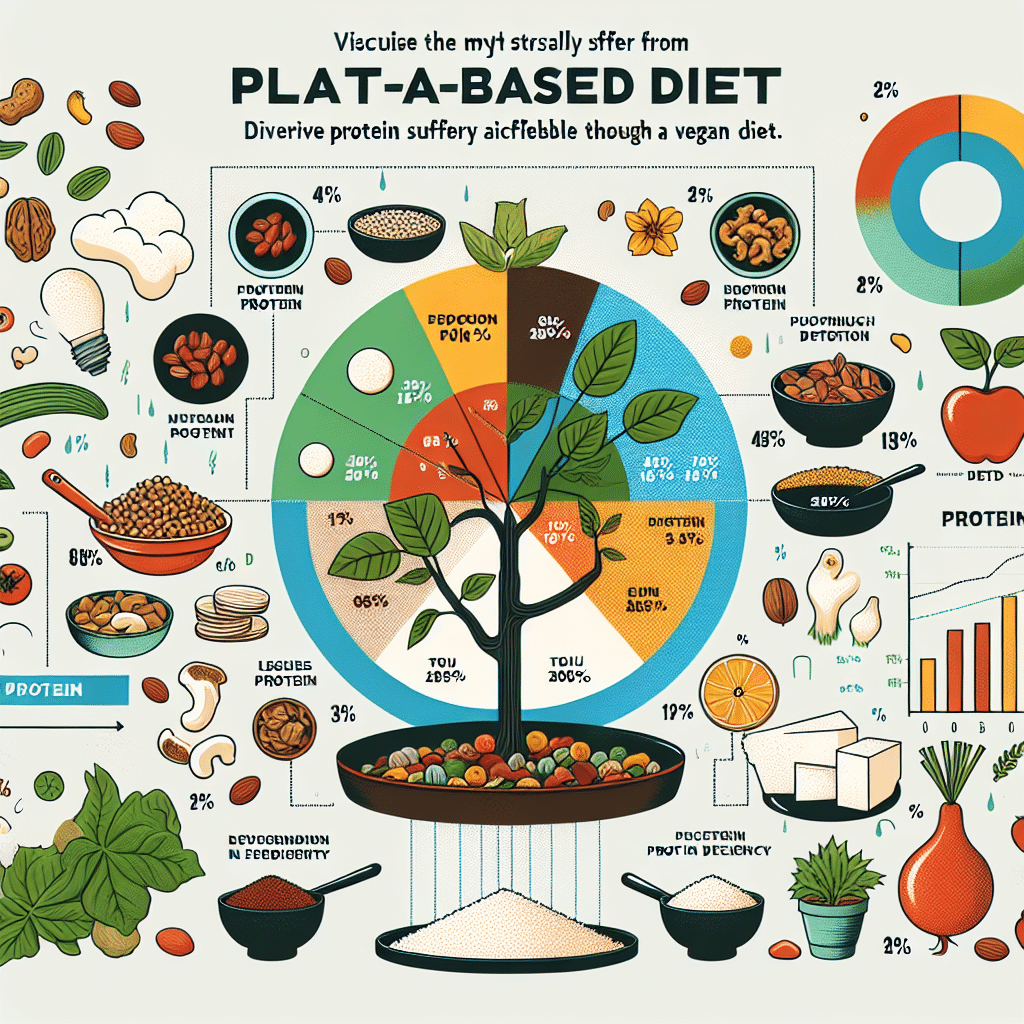Do Vegans Suffer From Protein Deficiency?
-
Table of Contents
- Vegans and Protein Deficiency: Myths and Realities
- Understanding Protein Needs
- Protein in a Vegan Diet
- Protein Quality and Digestibility
- Do Vegans Get Enough Protein?
- Case Studies and Statistics
- Combating Protein Deficiency in Vegan Diets
- Conclusion
- ETprotein: Your Source for High-Quality Vegan Proteins
Vegans and Protein Deficiency: Myths and Realities

Protein is a crucial macronutrient necessary for the building, maintenance, and repair of tissues in the body. A common concern about vegan diets is whether they provide enough protein. This article delves into the question: Do vegans suffer from protein deficiency? We will explore the evidence, discuss sources of plant-based protein, and examine how vegans can ensure they meet their protein needs.
Understanding Protein Needs
The Recommended Dietary Allowance (RDA) for protein for the average adult is 0.8 grams per kilogram of body weight per day. Athletes or those with specific health conditions may have higher requirements. It’s important to note that this recommendation is intended to meet the needs of nearly all healthy individuals.
Protein in a Vegan Diet
Vegans abstain from animal products, which are traditional sources of protein. However, a well-planned vegan diet can provide all the necessary nutrients, including protein. Plant-based sources of protein include:
- Lentils and beans
- Tofu and tempeh
- Seitan
- Nuts and seeds
- Whole grains like quinoa and brown rice
- Vegetables like broccoli and spinach
- Plant-based protein powders
These foods can help vegans meet their protein needs if consumed in adequate amounts.
Protein Quality and Digestibility
Protein quality is measured by its amino acid profile and digestibility. Animal proteins are considered “complete” because they contain all essential amino acids. Some plant proteins are incomplete, lacking one or more essential amino acids. However, by eating a variety of plant-based proteins throughout the day, vegans can obtain all essential amino acids.
Digestibility is also a factor, with plant proteins typically being less digestible than animal proteins. This is due to the presence of fiber and antinutrients in plants. However, processing methods like cooking, soaking, and fermenting can improve the digestibility of plant proteins.
Do Vegans Get Enough Protein?
Research indicates that most vegans can meet their protein needs. A study published in the Journal of the Academy of Nutrition and Dietetics found that vegan diets typically meet or exceed recommended protein intakes, as long as caloric intake is adequate.
However, certain populations within the vegan community may be at risk for protein deficiency, such as:
- Individuals with higher protein requirements (e.g., athletes, pregnant women)
- Those who restrict their caloric intake excessively
- Vegans who rely heavily on processed foods and neglect protein-rich whole foods
These individuals should pay particular attention to their protein intake and may benefit from consulting a dietitian.
Case Studies and Statistics
Case studies have shown that when individuals transition to a vegan diet without proper planning, they may experience a drop in protein intake. However, with education and dietary adjustments, these individuals can easily meet their protein needs.
Statistics from nutritional surveys reveal that protein deficiency is rare in Western countries, including among vegans. The key is a varied diet that includes multiple sources of plant-based protein.
Combating Protein Deficiency in Vegan Diets
To ensure adequate protein intake, vegans should:
- Include a variety of protein-rich plant foods in their diet
- Be mindful of their total caloric intake to ensure it’s sufficient
- Consider using fortified foods or supplements if necessary
- Plan meals to include complementary proteins that provide all essential amino acids
By following these guidelines, vegans can avoid protein deficiency and maintain a healthy and balanced diet.
Conclusion
In conclusion, while vegans do not consume traditional sources of protein such as meat, eggs, and dairy, a well-planned vegan diet can provide all the necessary protein. The key is to consume a variety of plant-based protein sources and ensure adequate caloric intake. With proper planning and knowledge, vegans can thrive without suffering from protein deficiency.
ETprotein: Your Source for High-Quality Vegan Proteins
If you’re looking for reliable sources of vegan protein, ETprotein offers a wide range of organic bulk vegan proteins that are perfect for anyone following a plant-based diet. Their products are characterized by a neutral taste, non-GMO, and allergen-free attributes, ensuring that you get the highest quality protein without compromising on dietary preferences or needs.
ETprotein’s offerings include Organic rice protein, clear rice protein, pea protein, clear pea protein, and various seed proteins, catering to a diverse range of industries. Whether you’re a manufacturer, distributor, or just someone looking to enhance your vegan diet, ETprotein has the protein solutions you need.
For more information or to sample their products, please contact ETprotein and email sales(at)ETprotein.com today.
About ETprotein:
ETprotein, a reputable protein and L-(+)-Ergothioneine (EGT) Chinese factory manufacturer and supplier, is renowned for producing, stocking, exporting, and delivering the highest quality organic bulk vegan proteins and L-(+)-Ergothioneine. They include Organic rice protein, clear rice protein, pea protein, clear pea protein, watermelon seed protein, pumpkin seed protein, sunflower seed protein, mung bean protein, peanut protein, and L-(+)-Ergothioneine EGT Pharmaceutical grade, L-(+)-Ergothioneine EGT food grade, L-(+)-Ergothioneine EGT cosmetic grade, L-(+)-Ergothioneine EGT reference grade and L-(+)-Ergothioneine EGT standard. Their offerings, characterized by a neutral taste, non-GMO, allergen-free attributes, with L-(+)-Ergothioneine purity over 98%, 99%, cater to a diverse range of industries. They serve nutraceutical, pharmaceutical, cosmeceutical, veterinary, as well as food and beverage finished product distributors, traders, and manufacturers across Europe, USA, Canada, Australia, Thailand, Japan, Korea, Brazil, and Chile, among others.
ETprotein specialization includes exporting and delivering tailor-made protein powder and finished nutritional supplements. Their extensive product range covers sectors like Food and Beverage, Sports Nutrition, Weight Management, Dietary Supplements, Health and Wellness Products, and Infant Formula, ensuring comprehensive solutions to meet all your protein needs.
As a trusted company by leading global food and beverage brands and Fortune 500 companies, ETprotein reinforces China’s reputation in the global arena. For more information or to sample their products, please contact them and email sales(at)ETprotein.com today.












